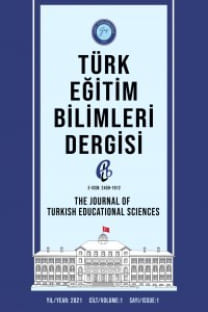PROBLEME DAYALI ÖĞRENMENİN ÖĞRENCİLERİN ELEŞTİREL DÜŞÜNME BECERİLERİNE ETKİSİ
Probleme dayalı öğrenme yöntemi, matematik öğretimi, eleştirel düşünme becerileri
THE EFFECT OF PROBLEM BASED LEARNING ON STUDENTS’ CRITICAL THINKING SKILLS
___
- Barrows, H. S. (1986). A Taxonomy of problem-based learning methods. Medical Education, 20, 481-486.
- Barrows, H. (2002). Is It truly possible to have such a thing as pbl? Distance Education, 23 (1) , 119-122.
- Birgegard, G., Lindquist, U. (1998). Change in student attitudes to medical school after the ıntroduction of problem based learning. Medical Education, 32, 46- 49.
- Büyüköztürk, Ş. (2002). Sosyal bilimler için veri analizi el kitabı. Ankara: Pegem Yayıncılık.
- Cantürk-Günhan, B. (2006). İlköğretim II. kademede matematik dersinde probleme dayalı öğrenmenin uygulanabilirliği üzerine bir araştırma. Yayınlanmamış doktora tezi, Dokuz Eylül Üniversitesi, Eğitim Bilimleri Enstitüsü, İzmir.
- Cooke, M., Moyle, K. (2002). Students’ evaluation of problem based learning. Nurse Education Today, 22, 330-339.
- Cüceloğlu, D. (1997). İyi düşün doğru karar ver (18. Baskı). İstanbul: Sistem Yayıncılık.
- Demirel, Ö. (2002). Kuramdan uygulamaya eğitimde program geliştirme. Ankara: Pegem Yayıncılık.
- Emir, S. (2004). Critical thinking disposition of teacher candidates. 2nd International Balkan Education Congress Searching Excellence in Education, (8-10 October 2004), Edirne: Trakya University, 46-50.
- Gür, H., Korkmaz, E. (2003). İlköğretim 7. sınıf öğrencilerinin problem ortaya atma becerilerinin belirlenmesi. www.matder.org.tr. (31/08/2005).
- How, R. W., Warren, C. R. (1989). Teaching critical thinking through environmental education. ERIC/SMEAC. Environmental Education Digest. No: 2 Ed324193. http://www.ntu.edu.au/education/oll/pbl/pbl_curric_asses.html (19/12/2003).
- Kahramaner, Y., Kahramaner, R. (2002). Üniversite eğitiminde matematik düşüncenin önemi. İstanbul Ticaret Üniversitesi Dergisi, s.2, 15-25.
- Karasar, N. (2000). Bilimsel araştırma yöntemi. Ankara: Nobel Yayın Dağıtım.
- Kökdemir, D. (2000). Kaliforniya eleştirel düşünme eğilimi ölçeğinin Türkçeye uyarlanması. Türk Psikoloji Bülteni.
- Krulik, S., Rudnick, J. A. (1999). Innovative tasks to improve critical and creative thinking skills. (Edited by Lee V. Stiff) Developing mathematical reasoning in grades K-12. 1999 Yearbook of National Council of Teachers of Mathematics, Reston, Virginia.
- Lee, W., Wong, F., Mok, E. (2004). Problem-based learning: ancient chinese educational philosophy reflected in a modern educational methodology. Nurse Education Today, 24 (4), 286-292.
- Lipman, M. (1988). Critical thinking: what can it be?. Educational Leadership, Vol 46, Issue 1 38-43.
- Mckendree, J., Small, C., Stennnig, K. (2002). The role of representation ın teaching and learning critical thinking. Educational Review, 54 (1), 57-67.
- Özden, Y. (2000). Öğrenme ve öğretme. Ankara: Pegem Yayınları.
- Özden, Y. (2006). Düşünmeyi öğrenme, konferans notları. http://bote.balikesir.edu.tr/~yozden/index.php?option=com_docman&task=ca t_view&gid=28&dir=DESC&order=name&limit=5&limitstart=0 (15/03/2006).
- Paul, Binker, Jensen, & Kreklau (1990). Critical Thinking Skills. http://www.ncrel.org/sdrs/areas/issues/envrnmnt/drugfree/sa3crit.htm. (10/10/2005).
- Sherpherd, N. G. (1998). The probe method: a problem based learning model’s affect on critical thinking skills of fourth and fifth grade social studies students. Dissertation Abstract Index, 59 (03), 779A.
- Torp, L., Sage, S. (2002). Problem as possibilities: problem-based learning for k-16 education. Alexandria, VA, USA: Association for Supervision and Curriculum Development.
- Walsh, D., Paul, R. (1988). The goal of critical thinking: From educational ideal to educational reality. Washington, D.C.: American Federation of Teachers.
- Yılmaz, Y., Yılmaz, Y. (2005). Parametrik olmayan testlerin pazarlama alanındaki araştırmalarda kullanımı: 1995-2002 arası yazın taraması. Dokuz Eylül Üniversitesi, Sosyal Bilimler Enstitüsü Dergisi, 7, 3, 177-199.
- Başlangıç: 2003
- Yayıncı: ANKARA HACI BAYRAM VELİ ÜNİVERSİTESİ
İlköğretim birinci kademesinde çoklu zeka kuramı uygulamalarının erişiye etkisi
A. Seda SARACALOĞLU, Murat ÇIRAKOĞLU
Hasan BACANLI, Tahsin İLHAN, Sevda ASLAN
PROBLEME DAYALI ÖĞRENMENİN ÖĞRENCİLERİN ELEŞTİREL DÜŞÜNME BECERİLERİNE ETKİSİ
Berna CANTÜRK-GÜNHAN, Neşe BAŞER
Hasan BACANLI, Tahsin İLHAN, Sevda ASLAN
SOSYAL BİLGİLER ÖĞRETİMİNDE TARİHİ YERLERİN KULLANIMININ AKADEMİK BAŞARIYA ETKİSİ
A. Kürşat GÖKKAYA, Cemil Cahit YEŞİLBURSA
Türkan SARIKAYA, Leyla KHORSHID
ÇOKLU ZEKÂ KURAMINA DAYALI ETKİNLİKLERİN KAVRAMSAL ÖĞRENMEYE ETKİSİ: TAM SAYILARDA DÖRT İŞLEM ÖRNEĞİ
Adnan BAKİ, Ramazan GÜRBÜZ, Suat ÜNAL, Ercan ATASOY
Selim Sabit Efendi'nin okul tarihi inşası
İLKÖĞRETİMİN BİRİNCİ KADEMESİNDE ÇOKLU ZEKÂ KURAMI UYGULAMALARININ ERİŞİYE ETKİSİ
Murat ÇIRAKOĞLU, A. Seda SARACALOĞLU
Çoklu zeka kuramına dayalı etkinliklerin kavramsal öğrenmeye etkisi: Tam sayılarda dört işlem örneği
